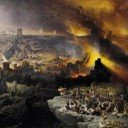Matt 24:34 Truly, I say to you, this generation will not pass away until all these things take place. [35] Heaven and earth will pass away, but my words will not pass away. [36] “But concerning that day and hour no one knows, not even the angels of heaven, nor the Son, but the Father only.
This is the point in the discourse that many, even those firmly entrenched within the preterist interpretive camp, that believe Jesus makes a shift in focus from the immediate expectancy of the coming judgment against Jerusalem and the temple, to a discussion of far off events like the Second Coming and Resurrection.
The argument is shown in those words and phrase in bold in the above passage. It is argued that jesus goes from discussing the “these things” to take within a generation to “that” day and hour that no one knows. The words “these” and “that” are indicators, they argue, that Jesus has changed the focus of the discourse and will now begin discussing those events to take place in the far future.
This is a legitimate interpretation, but, as we will see below, is not at all necessary. There are some grammatical difficulties with that view as well as some interpretive difficulties with some passages that follow this verse in trying to force them into a future expectation when the more natural interpretation would be found in the first century expectation.
In this post we will quickly examine the grammatical issues that may make supporting a shift more difficult, but not impossible.
The first is the use of the word “that day” in relation to a far off future event. The word “that” preceding the day must refer to some previous mention of a day. In other words, if this is a “new day” being discussed you could not refer to it as “that day” since no one would know what day was being referenced if it hadn’t been previously discussed.
Let’s put it in a modern situation. Imagine discussing a movie with a friend. You told them how much you enjoyed the dialogue, acting, storyline and conemetography. You went into great detail about the movie and how you believe it is “Oscar” worthy. Then you immediately changed subjects and stated that you really hated “that movie.” Which movie would your friend assume you were referring to if you never introduced the subject of the another movie?
This is what the reader must do when reading this passage, He is forced to travel backwards through the discourse to try and decipher the day that the “that day” references. The only that can made, and it is the common answer, is that the “that day” in question is the answer to the question regarding the “coming” of Christ in a physical, second coming way or the day that would signal the “end of the age.”
As we’ve discovered in the previous posts, the “coming” in view was a coming of judgment and a coming “up” to fulfill the Daniel 7 prophecy. If it references the day of the “end of the age” that too would have to be found in the first century since the only “age” the Disciples would be familiar with would be the current age they were living in, which would be the age of the Old Covenant. Remember the book of Hebrews addresses this issue by stating the older age was coming to an end while the newer age was coming into place.
So, in either instance the “that day” could not be referring to a future day since no future day was in view. In fact, as we discovered previously, the questions the Disciples asked were all tied in together. They noticed and noted that the destruction of the Temple, the coming of Christ and the end of the age were inter-related and could not be separated out. We also have seen how this ties together beautifully and covenantally…
- The Temple is destroyed signalling the end of the current age
- His vindication is physically present in the destruction of the Temple and signifies His presence in Heaven at the right hand of the father receiving His kingdom (Dan 7)
- These events would be witnessed by those alive at the time He spoke
- His coming is both in judgment (His blood on our hands and our children’s) and in glorification (Dan 7)
- Those alive witness to His vindication when His prophecy regarding the Temple being left desolate is fulfilled.
These and several previously discussed points make a beautiful tapestry of a covenantal fulfillment of this passage. It flows and expands upon the previous and does not need a change or shift.
In conclusion it is quite difficult to make the case that the “that day” refers to anything other than what has previously been discussed. If He were to have said something akin to, “In regards to that day of my coming” perhaps the case could be made, but even then it would not be too difficult to deal with the context of His coming in vindication and judgment previously affirmed.
In the next post we will show why the following verses after verse 36 make better since within the framework of the first century to help support the idea that the “that day” is still referencing the first century events. But please note that many men, much brighter than I would ever claim to be, have argued for this shift and it is by no means a poor or unwarranted case.
In a future post I will try and list those on both sides of the argument for your further study.





No comments:
Post a Comment